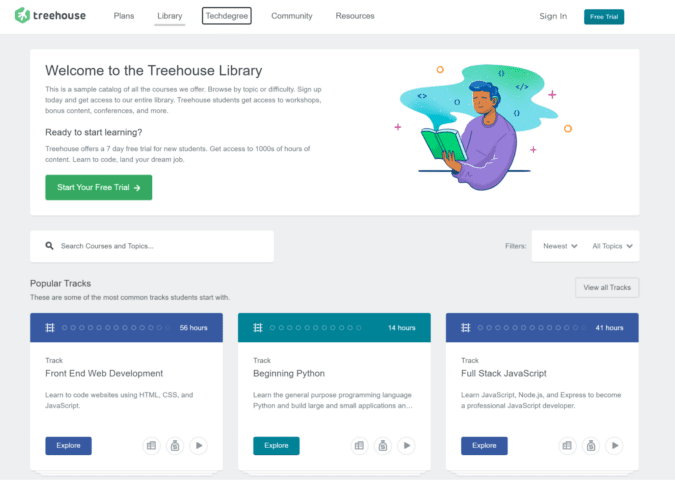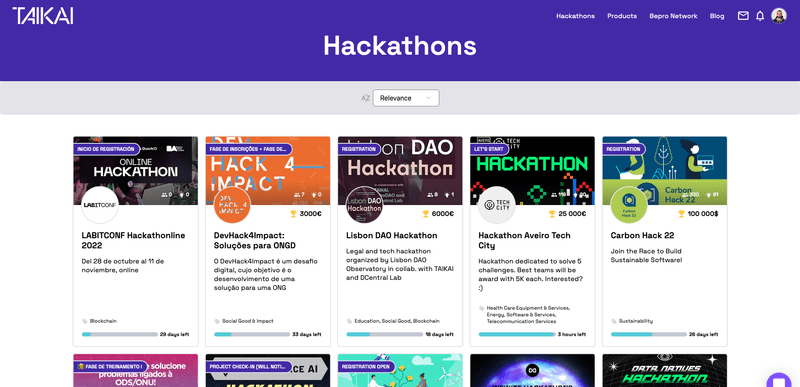How to Plan and Host a Virtual Hackathon [Article]

A recent report from HackerEarth found that 80% of Fortune 100 companies host a hackathon. Why do they do this? To drive innovation and generate fresh ideas. In the US alone, 350 hackathons are conducted every year.
Conducting such a massive undertaking requires a lot of resources. You’ll need a suitable event space and careful planning to get the right people in with the right ideas.
Instead of stressing about physical hackathon logistics, wouldn’t it be nice to focus on the event itself? Enter the online hackathon.
Let’s learn about how to plan and host a virtual hackathon.
What Is a Virtual Hackathon?
A virtual hackathon is an online event where people meet up to collaborate and solve issues. Individuals and teams propose innovative solutions to real-world problems and sprint to execute their ideas in relatively short amounts of time.
Hackathons are typically 24 to 48 hours long although they can last up to a week. Businesses host hackathons to generate innovative ideas with practical use cases. The entire event also provides great opportunities for industry networking and talent recruiting.
Virtual and traditional hackathons are mostly attended by developers, scientists, engineers, and those with tech degrees. However, hackathons can be used for any topic including marketing and business strategy.
A hackathon features a challenge or a theme for participants. Participants come up with solutions and present them before a judging panel. The winner of the competition is rewarded with money, gift cards, tech products, training, or even a job.
What Are the Benefits of Hackathons?
Hackathons are used by organizations all over the world in many industries.
Let’s examine some of the common benefits of successful hackathons for hosts and participants:
- Networking—both internal and external hackathons help attendees meet peers and subject matter experts in related fields. They can help companies make contacts for future partnerships.
- Solve problems quickly—blitzing a real-world issue helps open new doors and drive progress.
- Awards and recognition—event winners gain rewards in various forms from cash and gifts to career opportunities and peer recognition.
- Fostering a culture innovation—internal hackathons help you grow and focus innovation within your team.
- Promote collaboration—cross-departmental hackathons break down silos and encourage information sharing between different teams across your organization.
- Identify and recruit top talent—businesses can use hackathons for better recruitment. Top performers can be fast-tracked into interviews and kept on file for outreach.
- Education—many hackathons offer coding workshops and other online courses to attendees to help them upskill and gain knowledge.

Added Benefits of Hosting a Virtual Hackathon Event
Virtual hackathons go above and beyond traditional hackathons and offer additional benefits.
- Extend your reach—virtual events can easily be attended by anyone in the world with an internet connection.
- Experience the environment—Participants can engage in a virtual tour, gaining unique insights into the host organization’s culture and operational setting.
- Engage and energize—Incorporating virtual trivia games for work teams can provide a fun, engaging break that builds team spirit and keeps energy levels high during the event.
- Save money—no in-person event space is required. You only need minimal event staff to host and run the digital event. The resources to host a virtual event are a combination of free and affordable.
- Be more inclusive—enable those from diverse backgrounds, odd schedules, and caring responsibilities to attend and reap the benefits of a hackathon.
- Enhanced collaboration—virtual hackathon platforms and communication apps promote convenient conversations with any party at any time during the event.
- Online resources—presentations, workshops, and other exercises are recorded and readily available at any time for recall or to enhance e-learning in the future.
How to Plan and Host an Online Hackathon
Hosting an online hackathon still requires plenty of planning and execution.
1. Define Goals
Innovative projects and events need a focus. What are you hoping to gain out of hosting a virtual hackathon? Define goals that align with your business objectives. Maybe you have a pressing issue you want solved quickly.
Perhaps you want to encourage innovation internally. You may be hoping to identify top talent in your industry and its related fields. Setting goals for your hackathon will help guide the rest of the planning process.
2. Pick Your Target Audience
Who do you want to attend your event? You may want to invite those with science or tech degrees, or you could be looking at business leaders. What regions are you interested in targeting? Worldwide, national, or regional. Even with a virtual event, you may want to be focused geographically.
For example, let’s say HR needs to fill some vacant positions as quickly as possible. You can target an audience residing in your city and surrounding areas to recruit local top talent.
3. Choose a Theme and Challenges
What will be the theme or topic of your hackathon? You can be really specific or more general. It all depends on your goals. For instance, a common theme might be to develop a new product feature for call monitoring. Going more specific, you could challenge attendees to design better accessibility features for your mobile app.
4. Involve Key Stakeholders
Who at your company stands the most to gain from your digital event? Who will be most affected by any innovations or developments that result from the hackathon? Identify the key stakeholders for the event and get them on board with planning and hosting.
Having stakeholder input will ensure your efforts are practical and productive.
5. Use a Hackathon Hosting Platform
Online hackathons don’t require a physical venue. They do need a digital space to host the event. A hackathon hosting platform helps you manage registration, judging, presenting, and other aspects of hosting.

Choose a solution that fits your needs. It depends on how large of an event you want to host and what’s involved. Create a list of must-have features. Research and find a hosting platform that fits your budget and must-haves. Examples of hackathon solutions include Taikai, NayaOne, APIX, Devpost, Kaggle, and Zindi.
6. Establish Clear Guidelines
You want to host a fair and equitable competition. Develop clear rules and policies to guide attendees during the ideation, execution, and presentation phases. Well-defined guidelines will also expedite the judging process and eliminate vagaries or ambiguity.
Include a code of conduct in rules to promote professionalism and inclusivity. You’ll get the best results when every participant feels welcome and safe to speak their minds.
7. Recruit Experts as Judges
Your hackathon efforts will be futile if you don’t have the right people assessing the event. Recruit a panel of judges with relevant knowledge and experience for your theme. Partner with industry thought leaders if possible.
For some attendees, the panel itself is a selling point. Being able to present a solution to an industry expert is thrilling and rewarding for hackathon participants.
8. Promote
You need to get the word out about your hackathon in the months leading up to the event. Adjust your marketing tactics for developers and tech-related professionals (unless your theme is a non-technical topic).
For example, social media is a great way to promote your digital event. For tech professionals, LinkedIn and developer blogs are probably the best channels. If your hackathon is about visual design and marketing then Instagram could also be a good choice.
9. Offer Mentorships and Workshops
Help prepare attendees by offering mentorships and career building workshops before, during, and after the event.
For example, let’s say the theme is app connectivity. A live crash course on how to build a hybrid integration will jump-start the creative process.

Of course, the ability to gain expert insight is also a good way to entice your target audience to sign up for your hackathon.
10. Design Agenda and Wiki Page
Create an itinerary that all participants can access. A hackathon schedule ensures attendees don’t miss any of the important stuff and deliver on time. Virtual hackathons will normally run 24 hours per day so keep global time zones in mind.
Host your event agenda on an informational landing or wiki page. The page will keep the participants updated on guidelines, schedules, news, and any changes to the event.
11. Provide the Right Resources
You’ll get the best work from attendees by giving them the right tools. Those competing for awards will need resources like developer tools and environments. They may also need application licenses, tutorials, or sample code.
To further aid in rapid development, white label web development services can provide participants with customizable, pre-built software solutions, enhancing their ability to quickly adapt and execute their ideas.
Hackathon teams and individuals need ways to communicate and collaborate. Set up basic team messaging with freemium apps such as Slack, Skype, or WhatsApp. Or look to get a virtual phone number that is unique to the event. You can also use project management platforms to help teams collaborate and coordinate sprint tasks from a central hub.
12. Adhere to a Typical Hosting Structure
You don’t need to reinvent the hackathon wheel. Attendees will expect a basic structure.

- Welcome— greet attendees and go through a brief orientation. Set clear expectations and timelines. Use humor to promote a relaxed and engaged atmosphere.
- Ideation— teams meet and collaborate on solutions for your chosen theme such as an AI tool for sales. Event facilitators or mentors help sculpt the ideas into real-world applications, useful to your organization.
- Execution— teams or individuals sprint to realize their proposed solution. It’s the most crucial and time-sensitive aspect of the hackathon. With the right tools and support, most if not all teams will get across the finish line.
- Presentation— each team presents their ideas and how they arrived at their solution. Set a time limit so that everyone gets equal time and keep this phase succinct.
- Awards— the judging panel assesses and convenes to choose the winning presentations. Winners and prizes are announced.
- Closing— thank everyone for attending and for their hard work. Sum up what everyone learned and look forward to next year’s event.
13. Follow Up
Your online hackathon doesn’t end when the event does. You gathered brilliant people and ideas into one digital space. Make the most of the opportunity and stay connected to attendees. Email post-event surveys to participants to gain feedback.
Meet with your hackathon planning and hosting team and assess what went well and what didn’t. Combine internal insight with participant feedback to adjust and improve your virtual event for next time.
Hosting a Virtual Hackathon Levels Up Innovation
Hackathons are for organizations that want to breed innovative ideas and encourage collaboration. Your business can forget about the pains of hosting traditional events and go virtual.
A virtual hackathon is not only simpler to conduct, but it also comes with more benefits than an in-person hackathon.
You’ll widen your reach and appeal to a global audience. An online hackathon also is more inclusive of your remote and flexible teams. Did we mention hosting a virtual hackathon also saves you money?
Start planning today and you’ll be entering the hackathon world within months.

Become a UX Designer in 2024!
Learn to code with Treehouse Techdegree’s curated curriculum full of real-world projects and alongside incredible student support. Build your portfolio. Get certified. Land your dream job in tech.
Sign up for a free, 7-day trial today!
Start a Free Trial





